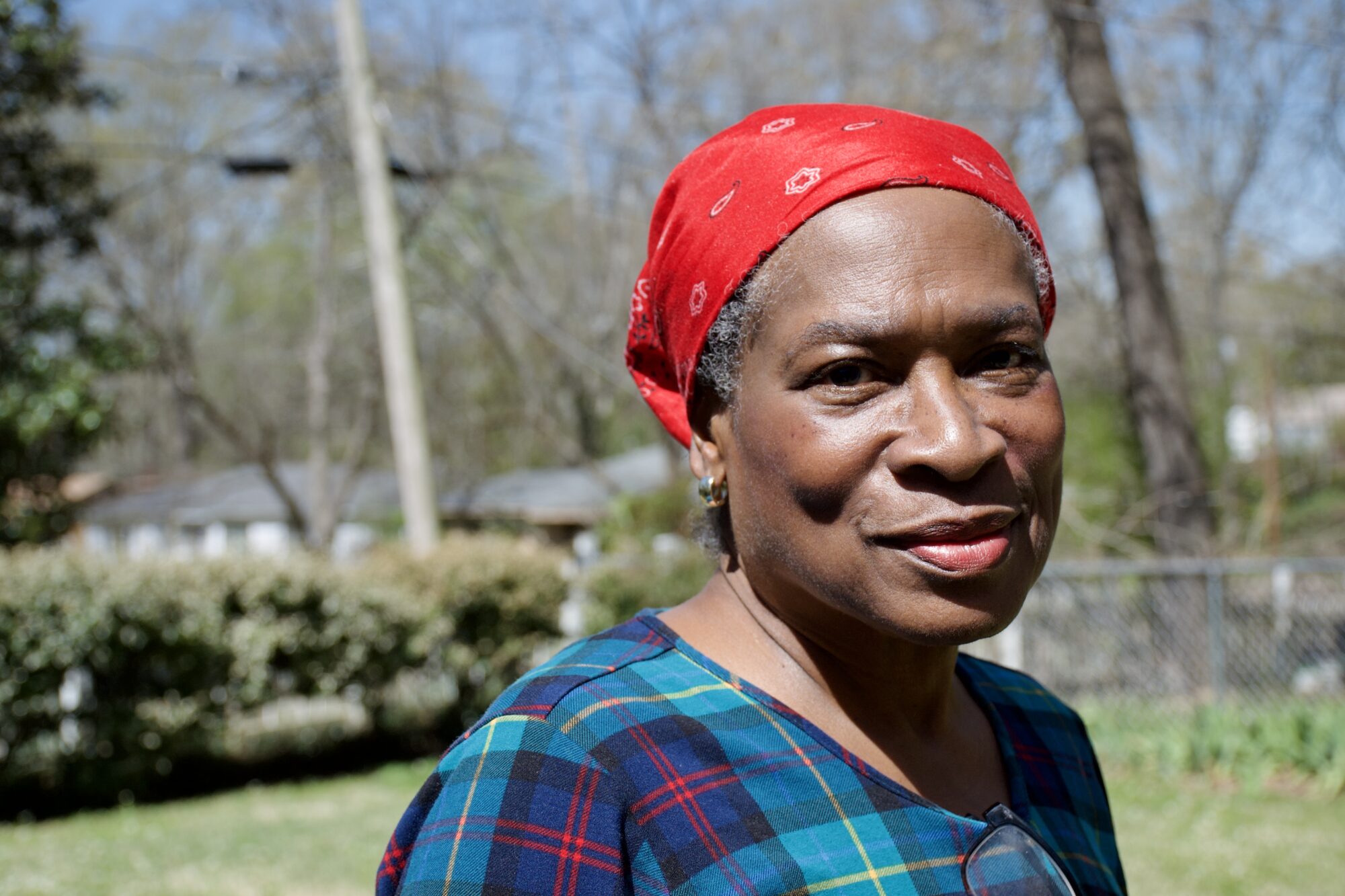Mississippi Today
A Jackson resident of Ward 3, due to city error, votes in Ward 1 primary
A Jackson resident of Ward 3, due to city error, votes in Ward 1 primary
For the last 10 years, north Fondren resident Patricia Ice has called private investment advisor Ashby Foote, the lone Republican on the Jackson City Council, her councilman.
But after the city redrew its ward maps last year due to population declines, the shape of the voting district Ice used to live in, Ward 1, shifted east, meaning she now lives in Ward 3.

With that came a new city representative, and from appearances, a polar opposite one: Democrat Kenny Stokes, a 33-year veteran on the council known for eccentric quotes delivered in a thick Southern accent. “The mayor must stop smoking that dope,” he said to the local TV station in 2022.
But because of an error that was later corrected, Ice and dozens of her neighbor’s addresses were initially left out of the move, resulting in Ice casting an invalid Ward 1 ballot in this year’s municipal primary election.
For some, the snafu has caused anxiety surrounding an election that, with 19 candidates in the mayoral race alone, has already proven difficult for residents to navigate.
“So when we vote, will our votes count or matter, since the ballots will be erroneous? Sounds like it could turn into a mess,” one of Ice’s neighbors wrote in a group messaging app.
In February, the Jackson City Clerk’s Office sent out some 6,000 letters to people who, like Ice, experienced a ward change, notifying them ahead of the April 1 primary Election Day which council race they would be voting in.
Ice’s neighbors on bordering streets received the mail confirming they’d been switched to Ward 3. They discussed it in the group chat. But Ice’s letter never came.
Ice called the city clerk, Angela Harris, and the Hinds County Circuit Clerk, Zack Wallace. She recited to them her Kings Highway address and they told her she still lived in Ward 1 – disregarding the published maps that showed her house inside Ward 3. Since Ice is over 65 years old, she had the opportunity to cast an absentee vote.
“That’s when I went to vote early because I said, ‘I’m going to see what’s on my ballot,’” Ice said.
On Mar. 7, Ice cast her vote in the Democratic primary election for Ward 1. Her preferred Ward 1 council candidate is an independent, so on the Democratic ballot, she wrote in her own name for that race. Harris told Mississippi Today Wednesday that Ice was the only person from the impacted section of Kings Highway to vote absentee.
The Secretary of State, which oversees elections, directed questions about this story to the local clerk, but told Mississippi Today that “any errors in redistricting that allow a voter to vote in the wrong district may result in an elections challenge.”
The 2020 U.S. Census found Jackson’s population fell by about 20,000 since 2010, with the decline especially affecting Ward 5 and 3, WLBT reported. The 1964 Voting Rights Act requires that the city’s population be evenly distributed among the districts, with no ward deviating in size by more than 10%, and requires governments to reevaluate every 10 years after the census.
The city commissioned the Central Mississippi Planning and Development District to help it redraw the lines and held public hearings to discuss the changes, which were adopted last August. Part of the hope was that in redrawing cleaner lines, the city could cut down on the number of split precincts, that is, the polling places that serve people of different wards and must manage handing out different ballots on Election Day.
Harris told Mississippi Today that she gave the new maps to the city’s GIS department, which culled the list of addresses that changed wards. Harris gave that list to Wallace, who was responsible for updating the voter registration database and pulling the names of residents who would need to be notified. But Wallace said the two-block section of Kings Highway from Meadowbrook to Northside Drive was left out of the spreadsheet of addresses he received.
“So those 50 something people are still right now in Ward 1,” Harris told Mississippi Today last week, not indicating a change would be made before the election.

If true, those Kings Highway residences would represent an island of Ward 1 voters inside Ward 3. Legally, wards must be contiguous, City Attorney Drew Martin said at a hearing last year.
“They cannot have islands or donuts within them,” Gray Ouzts, Principal Planner for the local planning and development district, told Mississippi Today.
After Mississippi Today spoke to Foote about the error last week, he added an agenda item to discuss the issue at the council’s Tuesday meeting. Then Harris took action, sending Wallace a list Monday of the Kings Highway addresses that had been left out. Wallace quickly updated the voter registration database to reflect their correct ward and letters went out to those residents the same day.
Another impacted Kings Highway resident, Jennifer Baughn, spoke to Mississippi Today before the correction was made. It may not have made a difference on the outcome of the race, but to Baughn, the error threatened to lock her out of the democratic process. Baughn concluded that if she’d received a Ward 1 ballot, she’d have voted for someone who wouldn’t actually represent her.
“That’s the essence of disenfranchised. And yet, there’s no acknowledgement from the city clerk … It’s ridiculous,” Baughn said before her voter registration was corrected. “I wasn’t super happy about being moved, but now I’m feeling like we won’t be getting representation from either (council member), because the Ward 1 candidate is going to know that we’re not going to be voters the next time, so why put the effort into our street? And we have major issues.”
Baughn said a new nightclub opened up within a block of her house, and the music and traffic have kept her awake into the wee hours of the night.
She said she’s also run into similar ambiguity about which of the separate police forces in Jackson are there to serve her. Take a noise complaint, for example. She said when she calls Jackson Police Department, an employee has told them she is in the jurisdiction of Capitol Police, and when she’s called Capitol Police, they’ve told her they don’t deal in city ordinance enforcement.
“We have no one to call. We call the police and they say, ‘Oh you need to talk to your council person,’ and I’m like, ‘Okay who is our council person?’” Baughn said.
Though he hasn’t made contact with his new constituents yet, Stokes is apparently up to speed on the issues residents in that area are facing, bringing up nightclubs unprompted. “I ride, I ride my whole ward,” Stokes said. “I ride, I look, I observe, and I pay attention to the different patterns that’s taking place.”
Abigail Hartman, president of the Fondren North neighborhood association, said her community was generally pleased when they learned they would be represented by Stokes, who they feel is more responsive to constituents, rather than Foote.
While Foote tinkers away in his office on maps he had made of all state-owned tax forfeited property in Jackson, a driver of blight across the city, Stokes appears at community events he’s organized, shaking hands and wearing his signature black hat with white serif font reading, “STOKES”.
Ironically, despite their quite different tacks, constituents of Stokes and Foote currently receive very similar representation on the council since the two men nearly always vote together, particularly on items where they have a chance to oppose Mayor Chokwe Lumumba.
“Politics makes for strange bedfellows,” Foote said. “We’ve both had differences with the mayor.”
In 2022, during a spat over selecting a new garbage contractor, Lumumba accused both Foote and Stokes of taking bribes from one of the vendors, which they both denied. (Hence, Stokes’ “smoking dope” quote).

Later, at the end of Foote’s term as council president, the Ward 1 councilman had replica black and white ball caps made for himself and all the other council members spelling their own names in “the Stokes lettering,” Foote said.
From hurling taunts like “Yo mama” or suggesting Black leadership “throw rocks and bricks and bottles” at suburb police to calling out Lumumba, who was eventually indicted by federal prosecutors, “Stokes has evolved a lot over the last eight years,” Foote said.
“I think he’s seen more as a voice of common sense now,” Foote said.
There are a total of 52 candidates running for either mayor or council this year, including Lumumba and 11 challengers in the Democratic primary for mayor April 1. Foote chose to run as an independent as a way to encourage his supporters to participate in the Democratic primary, which commonly determines the winner for mayor. Foote, who represents a whiter, wealthier part of the city in northeast Jackson, will face two challengers in the general election – the Democratic nominee and one independent. Four are running for Ward 1 in the Democratic primary.
So the north Fondren residents who moved from Ward 1 to Ward 3 have a little easier decision this election. Stokes does not face a challenger until the General Election in June, when he runs against one independent.
But once Hartman learned some residents in her association were told they’d still be voting in Ward 1, “We’re having to research double the amount of candidates,” she said.
“I’ve never had to work so hard in an election season,” Hartman said.
Adding to the confusion, campaign signs and mailers for Ward 1 candidates began popping up in Hartman’s neighborhood, causing residents to wonder who exactly was mistaken.
“If anything, it should have been caught. It’s sad that it took some of the individuals in the neighborhood to dig into this and find the information for themselves,” Hartman said.

Ice received a letter Tuesday notifying that her vote had been voided and she’d have to go back to City Hall to cast a new absentee ballot for Ward 3. But unlike some of her neighbors, she wasn’t too bothered. “I don’t mind going down there to vote again,” she said.
“I was never that worried about it,” Ice said. The only thing she’s sought from the council was, years ago, for them to add some speed bumps to her street, which never materialized.
The longtime immigrant rights attorney is much more concerned about what’s happening on a national level, the new Trump administration’s dismantling of federal programs and threats towards democracy, which she described as a coup d’état.
The local election ordeal did, however, remind Ice of the impression she had when she moved to Mississippi from her hometown of Detroit in 1998. She’d heard of Mississippi’s notorious history of voter intimidation and disenfranchisement, a legacy still visible today through the state’s attachment to some of the most restrictive voting laws in the nation. When Ice registered to vote in Mississippi for the first time, she said she was required to get the signature of a sponsor in her area.
“This is really true,” she remembered thinking, “they really do have a hard time voting here.”
This article first appeared on Mississippi Today and is republished here under a Creative Commons license.
Mississippi Today
Brain drain: Mother understands her daughters’ decisions to leave Mississippi
Editor’s note: This Mississippi Today Ideas essay is published as part of our Brain Drain project, which seeks answers to Mississippi’s brain drain problem. To read more about the project, click here.
Back when I was a kid in 1988, my mama and I had an argument about what I wanted to major in at college.
I had dreamed of being a journalist since the age of 8. To me, that meant that I was going to Ole Miss, which had the journalism department.
My mama said I could only go away from home to Ole Miss if I was going to major in law.
So I settled on going to Mississippi State University just down the road and majoring in communication. She told me I should major in engineering since that’s what State was known for.
I said, “That’s even dumber than me going to law school. I hate math.”
“Well, you could at least try,” she said.
I said no. Then she told me I was wasting my education and turned her back on me.
I get it. She knew and I knew that I couldn’t stay in Choctaw County where I was raised and earn a living with that degree. I would have to go somewhere else — probably to the Jackson metro area and work for Gannett or the Associated Press. Or to Memphis. Or Biloxi. Or even New Orleans. She never really forgave me for moving to the Jackson metro, working in my field and raising her grandchildren so far from her.
After a while, I got used to the pace of life around here. I knew I probably wouldn’t ever move anywhere else because I noticed that people who left Mississippi often came back, whether due to family obligations or a realization that “somewhere else” wasn’t quite all it was cracked up to be.
I also noticed that a lot of people played up how they were from Mississippi while making a very good living being someplace else. I decided I wanted to prove you could be from Mississippi, live in Mississippi, work in Mississippi and make something of yourself without leaving Mississippi.
But I noticed something else over the years, too. Most of the kids in Brandon dreamed of going off from home to cities like Atlanta, Nashville, Dallas, DC, New York or Orlando. They didn’t seem to have reasons — just a desire to get away from the state as fast as they could.
Then my three daughters and I started having conversations about what they wanted to major in when they went to college. My oldest wanted to be a chef. My middle one was undecided between chemical engineering and landscape architecture. And my youngest was fascinated with roads and bridges.
I was all too aware of what had happened in the job markets in Mississippi since I had come up. Companies closed operations in a globalized economy and fled to cheaper labor markets. The advent of the internet meant employers could hire from all over the world. Longtime business leaders retired and sold out to big corporations that reduced investments in local communities that had supported those businesses for decades and then complained that those towns didn’t offer enough amenities for their employees to want to relocate there.
But the reality really set in when my chef daughter chose her first internship — in historic Williamsburg, Virginia.
I would never have dreamed of driving that far from home to try out a place to work when I was her age. Then after her senior year, she interned at Walt Disney World and got hired full-time before the internship was over. She was off to live in Orlando where now with her husband and young son she’s creating community and loves going to work every day with a pretty enviable benefits package, too, a thing unheard of in the culinary world in Mississippi.
My middle one finally settled on chemical engineering and was picked for a co-op job in her first semester at age 18 at a company in Georgia. When she graduated four years later, we packed her off to Indiana for a research and development job, and she now lives in New Hampshire with her husband, making six figures a year at 26 years old and looking forward to partaking in the cultural offerings in New York City when she can.
The youngest is currently in college for civil engineering, and I’m bracing myself for the inevitable. She doesn’t want to work for state government, so she’s likely going out of state as well. Her comment about coming back to Jackson metro was the most damning of all. “There’s nothing to do here,” she says.
A lot of people ask me questions: How often do you see your daughters? How can you stand being so far from your grandson? Don’t they at least come home for Christmas?
The answer to all of those questions is that we do the best we can. We text, we message on Facebook, we talk on the phone at least once a week, every Sunday. We arrange visits; sometimes it’s us driving to them while other times they drive to us.
I can’t imagine making my children as miserable as my mom made me over my life choices. We are flexible, understanding, and very, very proud of our daughters, who are grappling with enough in their lives without us loading them down with guilt over when they are coming home.
The calculus may change in the future. We may have declines in health and need to move closer to one of our children if we need assistance. Or we may need to be in assisted living care here in Mississippi where such care may be marginally cheaper than wherever our girls land.
But I don’t wish our girls had settled for life in Mississippi.
What I wish is that Mississippi could find a way to live up to its potential — to be a place more worthy of my daughters’ loyalty, affections and investment in themselves.
Maybe it will be someday. I hope so, for all of our sakes.
Julie Liddell Whitehead lives and writes from Mississippi. An award-winning freelance writer, Julie covered disasters from 9/11 to Hurricane Katrina throughout her career. Her first book is “Hurricane Baby: Stories,” published by Madville Publishing. She writes on mental health, mental health education and mental health advocacy. She has a bachelor’s degree in communication, with a journalism emphasis, and a master’s degree in English, both from Mississippi State University. In 2021, she completed her MFA from Mississippi University for Women.
This article first appeared on Mississippi Today and is republished here under a Creative Commons Attribution-NoDerivatives 4.0 International License.
The post Brain drain: Mother understands her daughters' decisions to leave Mississippi appeared first on mississippitoday.org
Note: The following A.I. based commentary is not part of the original article, reproduced above, but is offered in the hopes that it will promote greater media literacy and critical thinking, by making any potential bias more visible to the reader –Staff Editor.
Political Bias Rating: Center-Left
This essay reflects a Center-Left perspective by focusing on social and economic challenges faced by Mississippi, such as brain drain, job market changes, and community decline. The tone is empathetic and advocates for investment in local opportunities and amenities to retain talent, aligning with progressive concerns about economic inequality and regional development. However, it remains largely personal and reflective rather than explicitly ideological or partisan. The article critiques systemic economic shifts without advancing a polarized political agenda, emphasizing hope for future improvement and a more supportive environment for young professionals.
Mississippi Today
After 30 years in prison, Mississippi woman dies from cancer she says was preventable
Behind Bars, Beyond Care:
A Mississippi Today investigation into suffering, secrecy and the business of prison health care
Susie Balfour, diagnosed with terminal breast cancer two weeks before her release from prison, has died from the disease she alleged past and present prison health care providers failed to catch until it was too late.
The 64-year-old left the Central Mississippi Correctional Facility in December 2021 after more than 30 years of incarceration. She died on Friday, a representative for her family confirmed.
Balfour is survived by family members and friends. News of her passing has led to an outpouring of condolences of support shared online from community members, including some she met in prison.
Instead of getting the chance to rebuild her life, Balfour was released with a death sentence, said Pauline Rogers, executive director of the RECH Foundation.
“Susie didn’t just survive prison, she came out fighting,” Rogers said in a statement. “She spent her final years demanding justice, not just for herself, but for the women still inside. She knew her time was limited, but her courage was limitless.”
Last year, Balfour filed a federal lawsuit against three private medical contractors for the prison system, alleging medical neglect. The lawsuit highlighted how she and other incarcerated women came into contact with raw industrial chemicals during cleaning duty. Some of the chemicals have been linked to an increased risk of cancer in some studies.
The companies contracted to provide health care to prisoners at the facility over the course of Balfour’s sentence — Wexford Health Sources, Centurion Health and VitalCore, the current medical provider — delayed or failed to schedule follow-up cancer screenings for Balfour even though they had been recommended by prison physicians, the lawsuit says.
“I just want everybody to be held accountable,” Balfour said of her lawsuit. “ … and I just want justice for myself and other ladies and men in there who are dealing with the same situation I am dealing with.”
Rep. Becky Currie, who chairs the House Corrections Committee, spoke to Balfour last week, just days before her death. Until the very end, Balfour was focused on ensuring her story would outlive her, that it would drive reforms protecting others from suffering the same fate, Currie said.
“She wanted to talk to me on her deathbed. She could hardly speak, but she wanted to make sure nobody goes through what she went through,” Currie said. “I told her she would be in a better place soon, and I told her I would do my best to make sure nobody else goes through this.”
During Mississippi’s 2025 legislative session, Balfour’s story inspired Rep. Justis Gibbs, a Democrat from Jackson, to introduce legislation requiring state prisons to provide inmates on work assignments with protective gear.
Gibbs said over 10 other Mississippi inmates have come down with cancer or become seriously ill after they were exposed to chemicals while on work assignments. In a statement on Monday, Gibbs said the bill was a critical step toward showing that Mississippi does not tolerate human rights abuses.
“It is sad to hear of multiple incarcerated individuals passing away this summer due to continued exposure of harsh chemicals,” Gibbs said. “We worked very hard last session to get this bill past the finish line. I am appreciative of Speaker Jason White and the House Corrections Committee for understanding how vital this bill is and passing it out of committee. Every one of my house colleagues voted yes. We cannot allow politics between chambers on unrelated matters to stop the passage of good common-sense legislation.”
The bill passed the House in a bipartisan vote before dying in the Senate. Currie told Mississippi Today on Monday that she plans on marshalling the bill through the House again next session.
Currie, a Republican from Brookhaven, said Balfour’s case shows that prison medical contractors don’t have strong enough incentives to offer preventive care or treat illnesses like cancer.
In response to an ongoing Mississippi Today investigation into prison health care and in comments on the House floor, Currie has said prisoners are sometimes denied life saving treatments. A high-ranking former corrections official also came forward and told the news outlet that Mississippi’s prison system is rife with medical neglect and mismanagement.
Mississippi Today also obtained text messages between current and former corrections department officials showing that the same year the state agreed to pay VitalCore $100 million in taxpayer funds to provide healthcare to people incarcerated in Mississippi prisons, a top official at the Department remarked that the company “sucks.”
Balfour was first convicted of murdering a police officer during a robbery in north Mississippi, and she was sentenced to death. The Mississippi Supreme Court reversed the conviction in 1992, finding that her constitutional rights were violated in trial. She reached a plea agreement for a lesser charge, her attorney said.
As of Monday, the lawsuit remains active, according to court records. Late last year Balfour’s attorneys asked for her to be able to give a deposition with the intent of preserving her testimony. She was scheduled to give one in Southaven in March.
Rogers said Balfour’s death is a tragic reminder of systemic failures in the prison system where routine medical care is denied, their labor is exploited and too many who are released die from conditions that went untreated while they were in state custody.
Her legacy is one RECH Foundation will honor by continuing to fight for justice, dignity and systemic reform, said Rogers, who was formerly incarcerated herself.
This article first appeared on Mississippi Today and is republished here under a Creative Commons Attribution-NoDerivatives 4.0 International License.
The post After 30 years in prison, Mississippi woman dies from cancer she says was preventable appeared first on mississippitoday.org
Note: The following A.I. based commentary is not part of the original article, reproduced above, but is offered in the hopes that it will promote greater media literacy and critical thinking, by making any potential bias more visible to the reader –Staff Editor.
Political Bias Rating: Center-Left
This article presents a critical view of the Mississippi prison health care system, highlighting systemic failures and medical neglect that led to the death of a formerly incarcerated woman. The tone and framing focus on social justice issues, prisoner rights, and the need for government accountability and reform, which align with Center-Left values emphasizing government responsibility for vulnerable populations. While the article is largely investigative and fact-based, its emphasis on advocacy for reform, criticism of privatized prison health contractors, and highlighting bipartisan legislative efforts suggest a Center-Left leaning perspective rather than neutral reporting.
Mississippi Today
FBI concocted a bribery scheme that wasn’t, ex-interim Hinds sheriff says in appeal
Former interim Hinds County sheriff Marshand Crisler is appealing bribery and ammunition charges stemming from his 2021 campaign, arguing that the federal government played on his relationship with a former supporter to entrap him.
Crisler had asked Tonarri Moore, who donated to past campaigns, for a financial contribution for the sheriff’s race. Moore said he would donate if Crisler helped with several requests. Without the previous relationship, Crisler would not have acted, his attorney argues, and Crisler had no reason to believe he was being bribed.
“The government, having concocted a bribery scheme to entrap Crisler, then had to contrive a corresponding quid pro quo to support the scenario with which to entrap him,” attorney John Holliman wrote in a Saturday appellant brief.
Crisler is asking the U.S. 5th Circuit Court of Appeals to reverse his conviction and render its own rulings on both counts.
He was convicted in federal court in November after a three-day trial and sentenced earlier this year to 2 ½ years in prison. Crisler is serving time in FCI Beckley in West Virginia.
The day before Crisler reached out to Moore to ask for support for his campaign for sheriff, Drug and Enforcement Administration agents raided Moore’s home and found guns and drugs. An FBI agent called to the scene looked through Moore’s phone and saw Crisler had called.
According to the appellant brief, the agent asked Moore what Crisler would do if offered money, and if Moore was bribing him. Moore said he wasn’t bribing Crisler, and the agent asked if Moore would do it.
At that time, there weren’t reasonable grounds to start a bribery investigation into Crisler, his attorney argues, nor was there reason to believe he was seeking a bribe.
Moore agreed to become an informant for the FBI, in exchange for the government not prosecuting him for the guns and drugs.
The FBI fitted him with a wire to record Crisler during meetings, which began that day. The meetings included one inside Moore’s night club and a cigarette lounge in Jackson. Agents provided Moore with the $9,500 he gave to Crisler between September and November 2021.
Crisler’s 2023 indictment came as he campaigned again for sheriff and months before the primary election. He remained in the race and lost to the incumbent who he faced in 2021.
At trial, the government argued the exchange of money were attempts to bribe because Moore made several requests of Crisler: to move his cousin to a different part of the Hinds County Detention Center, to get him a job in the sheriff’s office and for Crisler to let Moore know if law enforcement was looking into his activities.
In closing arguments, Assistant U.S. Attorney Charles Kirkham pointed to examples of quid pro quo in recordings, including one where Moore said to Crisler, “You scratch my back, I scratch yours” and Crisler replied “Hello!” in a tone that the government saw as agreement.
The appellant’s brief argues that without Moore’s requests, the government lacked a way to show quid pro quo, a requirement of bribery charge: that Crisler committed or agreed to commit an official act in exchange for funds.
Moore also asked Crisler to give him bullets despite being a convicted felon, which is prohibited under federal law. The brief notes how the government directed Moore to come up with a story for needing the bullets and to ask Crisler to give them to him.
In response, Crisler told Moore he could buy bullets at several sporting goods stores. Moore said they ran out, and eventually Crisler gave him bullets.
Crisler also argues that the government prosecuted routine political behavior. Specifically, accepting campaign donations is not illegal, and can not constitute bribery unless there is an explicit promise to perform or not perform an official act in exchange for money.
“Our political system relies on interactions between citizens and politicians with requests being made for this or that which is within the power of the elected official to do,” the brief states. “This does not constitute a bribery scheme. It is the normal working of our political system.”
This article first appeared on Mississippi Today and is republished here under a Creative Commons Attribution-NoDerivatives 4.0 International License.
The post FBI concocted a bribery scheme that wasn’t, ex-interim Hinds sheriff says in appeal appeared first on mississippitoday.org
Note: The following A.I. based commentary is not part of the original article, reproduced above, but is offered in the hopes that it will promote greater media literacy and critical thinking, by making any potential bias more visible to the reader –Staff Editor.
Political Bias Rating: Center-Right
The article presents the legal appeal of former interim Hinds County sheriff Marshand Crisler with a focus on his argument that the FBI orchestrated an entrapment scheme. The language is largely factual and centers on the defense’s claims and legal standards for bribery, emphasizing normal political behavior versus illegal conduct. While the article reports on the government’s position, it gives significant space to Crisler’s defense and critiques of federal prosecution tactics. This framing, highlighting skepticism toward federal law enforcement and emphasizing the defense perspective, suggests a slight center-right leaning, reflecting a cautious stance on government overreach without overt ideological language.
-
Mississippi Today4 days ago
After 30 years in prison, Mississippi woman dies from cancer she says was preventable
-
News from the South - Georgia News Feed5 days ago
Woman charged after boy in state’s custody dies in hot car
-
Our Mississippi Home7 days ago
Porch Lights and Lightning Bugs: An August Evening in Mississippi
-
News from the South - Kentucky News Feed7 days ago
Bowling Green man faces drug charges following traffic stop
-
News from the South - Texas News Feed6 days ago
Texas VFW holds memorial service for WWII pilot from Georgetown
-
News from the South - Georgia News Feed4 days ago
Georgia lawmakers to return this winter to Capitol chambers refreshed with 19th Century details
-
News from the South - Florida News Feed5 days ago
Warning for social media shoppers after $22K RV scam
-
News from the South - Missouri News Feed7 days ago
Cell data, surveillance footage aided in arrest of husband for pregnant woman's murder in Lebanon


















































